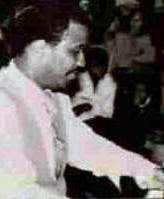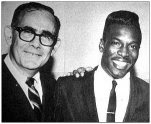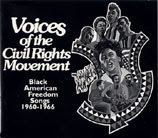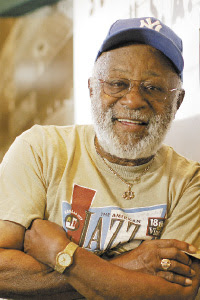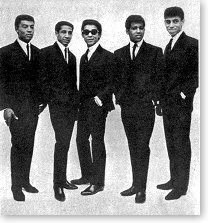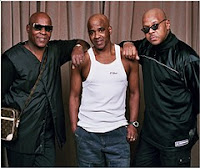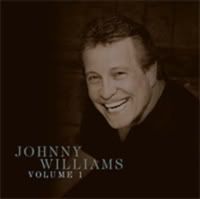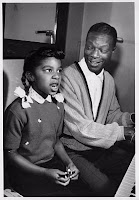
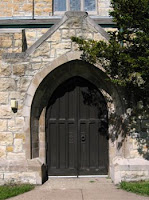 The story of George Lou Pride begins in Chicago's North Side on 24th May 1950, when he was born. He performed a solo at grade school and became hooked on music! Along with his family, support came from local pastors Reverend Charles L Fairchild, and Reverend Edward J. Cole of the First Baptist Church. Father of singer Nat King Cole, Reverend Cole gave Lou advice about music as well as spiritual advice, and encouraged him to sing in the choir, directed by his wife Perlina. Lou recalls meeting Nat many times and greeting him in the street, and spent many days at the Cole house playing marbles with Natalie Cole, but it was BB King who was his biggest influence.
The story of George Lou Pride begins in Chicago's North Side on 24th May 1950, when he was born. He performed a solo at grade school and became hooked on music! Along with his family, support came from local pastors Reverend Charles L Fairchild, and Reverend Edward J. Cole of the First Baptist Church. Father of singer Nat King Cole, Reverend Cole gave Lou advice about music as well as spiritual advice, and encouraged him to sing in the choir, directed by his wife Perlina. Lou recalls meeting Nat many times and greeting him in the street, and spent many days at the Cole house playing marbles with Natalie Cole, but it was BB King who was his biggest influence.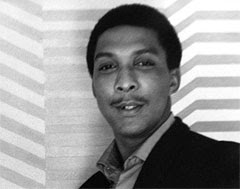 In the late 60s, Lou was drafted into the US Army, and spent two years on bases in Germany, where he joined a group called The Karls. After leaving the army, he returned to Chicago, and formed a Sam & Dave style duet with a friend called LC, called LC & Lou (some sources claim that Lou was singing with and married to a woman known as 'JLC', but in Drew Vergis's interview Lou clearly states otherwise). After LC left the group to get married, Lou's manager Jim Dorman persuaded Lou to start a solo career. He decided to move to a new life in El Paso, Texas, where they thought they could get a deal with some friends.
In the late 60s, Lou was drafted into the US Army, and spent two years on bases in Germany, where he joined a group called The Karls. After leaving the army, he returned to Chicago, and formed a Sam & Dave style duet with a friend called LC, called LC & Lou (some sources claim that Lou was singing with and married to a woman known as 'JLC', but in Drew Vergis's interview Lou clearly states otherwise). After LC left the group to get married, Lou's manager Jim Dorman persuaded Lou to start a solo career. He decided to move to a new life in El Paso, Texas, where they thought they could get a deal with some friends. Lou met a friend of Jim's, Kenny Smith, in an El Paso restuarant. Kenny was sure from the start that Lou was going to make fantastic music: "Lou Pride is one of the best people I have ever dealt with over the many years I have been involved in the music business." He decided to sign Lou to Suemi Records (their publicity tag-line read: "If you don't like it, sue me!"), which he co-owned with Bill 'Sparks' Taylor, and which had recorded a variety of country and rockabilly artists, and had some success with Bobby Fuller. When Lou arrived at their Tasmit Studio, Kenny was impressed and excited:
Lou met a friend of Jim's, Kenny Smith, in an El Paso restuarant. Kenny was sure from the start that Lou was going to make fantastic music: "Lou Pride is one of the best people I have ever dealt with over the many years I have been involved in the music business." He decided to sign Lou to Suemi Records (their publicity tag-line read: "If you don't like it, sue me!"), which he co-owned with Bill 'Sparks' Taylor, and which had recorded a variety of country and rockabilly artists, and had some success with Bobby Fuller. When Lou arrived at their Tasmit Studio, Kenny was impressed and excited:"He showed up to our studios wanting to put out a record of his band "The Funky Bunch" and I was glad to have a different type band play in the studio. They had horns and I had never dealt with horns before."
 The Funky Bunch were a group of Lou's aquaintances from the nearby Fort Bliss army base. While he was astounded by their musicianship, Kenny wasn't so impressed with their name, and began searching for a better one. He thought wrongly that Lou billed himself as 'The Groove Merchant', so when it came to naming the band for the 45, The Groove Merchants was printed on the label.
The Funky Bunch were a group of Lou's aquaintances from the nearby Fort Bliss army base. While he was astounded by their musicianship, Kenny wasn't so impressed with their name, and began searching for a better one. He thought wrongly that Lou billed himself as 'The Groove Merchant', so when it came to naming the band for the 45, The Groove Merchants was printed on the label.Just 500 copies were pressed, and most were sold just in the local area. While the single never broke nationally, it was played frequently by Johnny "T" Thompson, a DJ at the time (who himself recorded songs such as So Much Going For You on Chess Records, the Top 20 hit Main Squeeze and Given Up On Love on New Miss Records, and more recently performed with the late Bill Pinkney in the Original Drifters). It provided Lou with regular bookings on the chittin' circuit across Texas. Lou explained to Drew Vergis how "the old hard-time crusty promoters" in Texas helped him hone his stage performance: "Percy told me one day, 'Boy, you're pretty good son, but you stay on stage too long! Get off the stage , son!'" That of course, led him to spend more and more nights away from his family home on the road. Despite this, Kenny describes Lou thus: "Lou was and still is one of those people that never complains and is always in a positive mood."
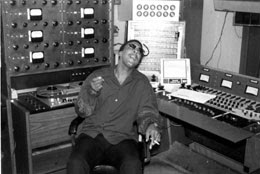 For the next Lou Pride session, Bill Taylor used his contacts through his uncle, who owned the distributor Hot Line Music Journal in Memphis and owned some stock in Hi Records, to arrange studio time at Willie Mitchell's Royal Studio. It is here that Lou recorded his funky, uptempo version of It's A Man's Mans World, backed by the Hodges Brothers and Howard Grimes. Sadly, it would be a short interlude, as Lou's family commitments life made extended trips away increasingly difficult.
For the next Lou Pride session, Bill Taylor used his contacts through his uncle, who owned the distributor Hot Line Music Journal in Memphis and owned some stock in Hi Records, to arrange studio time at Willie Mitchell's Royal Studio. It is here that Lou recorded his funky, uptempo version of It's A Man's Mans World, backed by the Hodges Brothers and Howard Grimes. Sadly, it would be a short interlude, as Lou's family commitments life made extended trips away increasingly difficult.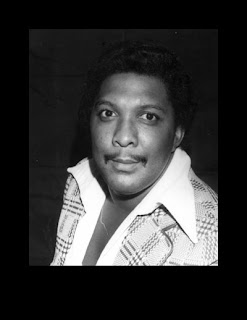 Lou would continue to record for Suemi for another year, back in El Paso. I told some of the story of Lou's classic Northern Soul hit I'm Com'un Home In The Morn'un last year in another post. It highlighted the difficulties Lou was facing in trying to recording in El Paso, for Suemi, tour and gig to make money, and still make visits to his new girlfriend and to his family and children living up in Chicago. According to Kenny Smith, just 500 copies again were pressed. Ironically, had half of the thousands of UK bootlegs been genuine, Lou Pride would have been able to put his financial worries behind him, but Suemi Records had no idea that anyone in England had even heard of it. Instead, Lou, now a single father raising his young children, devoted himself to supporting them by keeping up his touring and live performances at jazz and blues festivals. As Lou describes it in an interview with Drew Vergis; "I was doing good on the road, then my mother got sick, and then things just fell apart!" In the late 70s, he returned to Chicago to visit his sick mother. She told him to go visit the Reverend Fairchild, in the church not 25 yards from his front door:
Lou would continue to record for Suemi for another year, back in El Paso. I told some of the story of Lou's classic Northern Soul hit I'm Com'un Home In The Morn'un last year in another post. It highlighted the difficulties Lou was facing in trying to recording in El Paso, for Suemi, tour and gig to make money, and still make visits to his new girlfriend and to his family and children living up in Chicago. According to Kenny Smith, just 500 copies again were pressed. Ironically, had half of the thousands of UK bootlegs been genuine, Lou Pride would have been able to put his financial worries behind him, but Suemi Records had no idea that anyone in England had even heard of it. Instead, Lou, now a single father raising his young children, devoted himself to supporting them by keeping up his touring and live performances at jazz and blues festivals. As Lou describes it in an interview with Drew Vergis; "I was doing good on the road, then my mother got sick, and then things just fell apart!" In the late 70s, he returned to Chicago to visit his sick mother. She told him to go visit the Reverend Fairchild, in the church not 25 yards from his front door:"My pastor Reverend Fairchild, Curtis [Mayfield], Marvin [Yancy], Kevin Yancy, Natalie [Cole], my mom, all of them grew up together, and I said to my parents “Man I need a record deal!” He [Reverend Fairchild] said , “Well come on, come on, go to Atlanta with me." He said, "You'll need some hotel money", so I went down there, and he fed me and took good care of me , and he said, "Go to your room , I'll call you when I need you." I didn’t know what was goin' on, and he called the room the next day and said, "Come downstairs, someone wanna meet you", and Curtis Mayfield’s sitting in the room! You know how your mouth just drops? There's nothing to say but "How you doin', Curtis, I love you and admire you." By them being friends the Rev erend just says, "Curtis - the man needs a record deal", so Curtis says,"Can you sing?" "Yeah, sure, he sang in my choir!" So Curtis says I’ll give him a record deal!"
Curtis was impressed with Lou, and they were working on an album for Curtom Records , writing half of the songs each, up until Curtis Mayfield's accident in 1985. Several of those songs appeared later on CDs, as Lou continued to work with colleagues of Curtis with his support. "I never ever saw him with sadness on his face" recalls Lou. It seems to be a temperament they have had in common.
And Lou is still recording, now with Severn Records with labelmates such as Johnny Jones, formerly of the King Kasuals, and still touring. Speaking of his first tour in England in 2003: "When I got there it was an amazing sight for me, people just wanted to touch me and take pictures of me,and oh god, it was just beautiful man!"
Back to the beginning of the story, in El Paso with those 'Groove Merchants', and then the b-side to Lou's funky It's A Man's Man's World:
The Groove Merchants (Lou Pride & The Funky Bunch) - There's Got To Be Someone For Me (Suemi 4557)
Lou Pride - Your Love Is Fading (Suemi 4571 B)
Buy CDs of Lou Pride's recordings from Severn Records. Jazzman Records also sell a vinyl special edition containing three reissue singles. A recorded interview with Lou Pride from 2004, by Drew Vergis, can be heard at DirtyDj.com. Quotes by Kenny Smith come from the Suemi Records website. Further information about Lou Pride comes from liner notes to Lou Pride: The Suemi Sessions, written by Kym Fuller and 'Jazzman' Gerald Short. Check out Vincent's FuFu Stew at the moment for a fabulous link to Natalie Cole Live. Unverified 'JLC' story credited to Andrew Hamilton of the All Music Guide...


